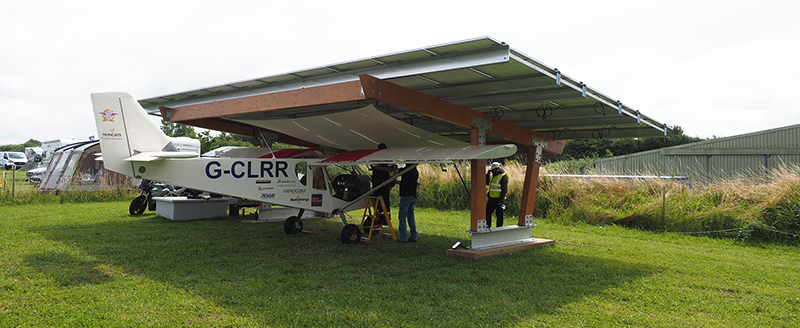Hanwha Q CELLS Modules Give Lift-Off for Europe’s First Solar-Powered Electric Aircraft Charging Point
- The installation at the UK’s Old Buckenham Airfield uses Hanwha Q CELLS’ Q.PEAK DUO L-G8 modules to generate photovoltaic electricity for an innovative electric sky jeep, developed by British Community Interest Company NUNCATS.

A total of 33 Hanwha Q CELLS modules sit atop this specially adapted charging port for electric aircraft. (Image: Andy McNair)
Solar-powered aviation is ready for lift-off thanks to a boundary-breaking collaboration between the UK’s Old Buckenham Airfield in the UK, electric light aircraft pioneers NUNCATS, and solar technology giant Hanwha Q CELLS.
The UK’s first electric aircraft charging point has been installed at the East Anglian airfield, courtesy of NUNCATS – a community Interest Company (CIC) that aims to provide a dependable lifeline for some of the world’s most remote communities via electrical light aircraft.
This unit, installed by renewable energy developer Renenergy for NUNCATS (which stands for No Unnecessary Novelty, Community Air Transport Systems), is not only the inaugural electric plant port in the country, but is also Europe’s first solar-powered electric aircraft charging point thanks to the 33 Q.PEAK DUO L-G8 Hanwha Q CELLS solar modules installed on top of the hangar.
Hanwha Q CELLS’ Q.PEAK DUO L-G8 425W modules provide solar power to a specially adapted Zenith 750 aircraft – or ‘electric sky jeep’ – which has begun a series of solar-powered sorties above the East Anglian skies to demonstrate how sustainably powered light aviation can really make a difference in many of the most remote parts of the world.
Isolated and disconnected villages and townships suffer from their remoteness in many ways. Light aviation already plays a critical role in keeping the people who live in these remote regions connected to the modern world, but refueling facilities are usually scarce, with conventional fuel also expensive, polluting and unsustainable. In much the same way that solar microgrids have begun to transform the foundations of energy supply to off-grid parts of the world, NUNCATS believes that solar-powered plane portals can play a similar role in vastly improving access and service to these regions – cleanly and affordably.
For Hanwha Q CELLS, this partnership is an opportunity to demonstrate the exceptional reliability and efficiency of its solar modules. The Q.PEAK DUO L-G8 module series guarantees high performance, a high yield per surface area and an efficiency rate of up to 20.3%. The modules are made with Hanwha Q CELLS’ proprietary, patent-protected passivation technology Q.ANTUM, which helps them deliver even greater long-term yield security and long-lasting, low maintenance performance under a 25-year performance warranty.
NUNCATS’ co-founder Tim Bridge hopes that the installation – which is based on an adapted car port developed by Renenergy – can serve as a launchpad for the further electrification of the skies – powered by solar energy. “In developed economies, the benefits of electric planes are very much about reducing CO₂ and noise emissions,” Tim said. “For the rest of the world, a major untapped benefit of electric aircrafts is that they can provide a resilient, low-maintenance transit alternative that is de-coupled from fossil fuel supply chains.” The prototype aircraft currently charged by Hanwha Q CELLS modules boasts a 30 kWh battery, which can power a 30-minute flight – the base minimum for efficacy in rural parts of the world.
The current plane port at Old Buckenham Airfield uses a single-phase charger run at 5 kW, but there are several options for integrating faster solar-powered charging depending on the best-use case.
Ross Kent, Head of Sales for Hanwha Q CELLS UK, added: “Solar power has torn down all sorts of barriers to sustainable progress over the past few years, and the aviation industry is next in its sights. The capacity of solar to change the landscape of light aircraft transportation is vast, and Hanwha Q CELLS is therefore delighted to have partaken in this unique pilot project with NUNCATS that we hope will be quickly scaled up to begin meeting the needs of remote communities around the world – affordably and efficiently.”
Hanwha Qcells
Hanwha Qcells (Hanwha Solutions Qcells division) is one of the world’s leading clean energy companies, recognized for its established reputation as a manufacturer of high-performance, high-quality solar cells, and modules, a portfolio of intelligent storage systems, and a growing international pipeline of large-scale renewable energy projects. Hanwha Qcells also provides renewable electricity retail services and packages to end customers the world over. The company is headquartered in Seoul, South Korea (Global Executive HQ) and Thalheim, Germany (Technology & Innovation HQ) with its diverse international manufacturing facilities in the U.S., Malaysia, China, and South Korea. Hanwha Qcells strives to offer Completely Clean Energy through the full spectrum of photovoltaic products, storage solutions, renewable electricity contracting, and large-scale solar power plants. Through its growing global business network spanning Europe, North America, Asia, South America, Africa, and the Middle East, Hanwha Qcells provides excellent services and long-term partnerships to its customers in the utility, commercial, governmental, and residential markets.
For more information, visit: www.qcells.com/us/
About Hanwha Solutions
Hanwha Solutions aims to deliver sustainable solutions for the planet through smart energy solutions and customer-focused materials. The Company operates its business through five divisions: Q CELLS, Chemical, Advanced Materials, Galleria and City Development. The Q CELLS Division offers total energy solutions from photovoltaic module manufacturing, power plant operation to electricity retailing service. The Chemical Division, the first in Korea to produce polyvinyl chloride (PVC), manufactures various chemical products and eco-friendly plasticizers. The Advanced Materials Division produces high-tech materials for automotive, photovoltaic and electronic devices. The Galleria Division, an operator of premium department store chain, provides premium fashion and food services. The City Development Division is a leading real estate developer specializing in industrial complexes. With its innovative technologies for sustainable growth, Hanwha Solutions strives to become a global leader in bringing a better future for humanity.
For more information, visit: hanwhasolutions.com/en/
Get the latest news about Hanwha, right in your inbox.
Fields marked with * are mandatory.
- Non-employee
- Employee



